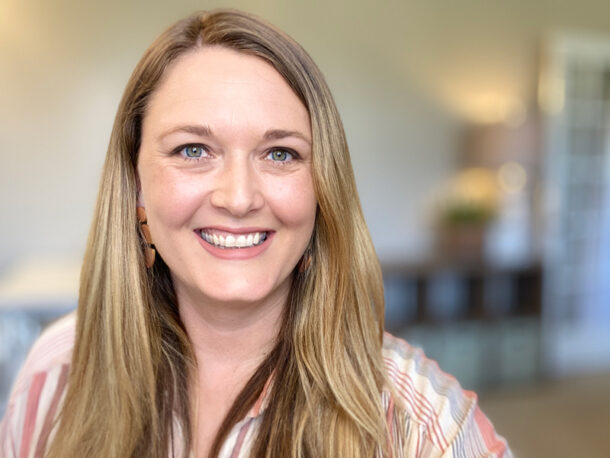Speak Clear English - Enroll Today
Weekly English Lesson:
3 English Expressions to Inspire Hope
(with Diana Derringer)
On this episode of the podcast, we have a very special guest, Diana Derringer, who joins us to talk about 3 English Expressions to Inspire Hope. Right now, we all need a little hope, which is why it’s the perfect time to bring Diana on the podcast.
Listen to the lesson…
3 English Expressions to Inspire Hope (with Diana Derringer)
Audio PlayerLet’s Get Started
Diana Derringer is an inspirational writer. She has written 40-plus publications, in places such as The Upper Room, The Secret Place, Missions Mosaic, Clubhouse, Chicken Soup for the Soul, Country, Kentucky Monthly, and Kentucky Living. Diana has also write a radio drama for Christ to the World Ministries and is a contributing author to several anthologies. Her poetry has received first prize awards from the Kentucky State Poetry Society.
I know Diana because we lived in the same small Kentucky town for many years, and we had a connection over the fact that we both write for English learners. Diana has a blog at DianaDerringer.com called “Words, Wit, and Wisdom: Life lessons from English expressions.”
Today Diana is going to share with you some English expressions and how those connect to some great life lessons.
Diana first got started writing her blog, because she and her husband serve as a friendship family for Campbellsville University. One morning, she was walking with a student from Taiwan, and the student asked Diana what an English expression meant, and how to use it. They would meet together most mornings and talk about different English expressions, and what they meant. Several months later, Diana decided to start her blog in order to help the Taiwanese student and others understand English expressions and how to use them. Since Diana started the blog, she has found that both English learners and native English speakers enjoy the word play and the life lessons that go along with them.
Diana usually writes blogs that have three parts:
1) the English expressions
2) an explanation of that English expression
3) a related life lesson and a closing devotional thought
Many of the English expressions Diana chooses fits under the category of wisdom, self-improvement, and relationships. Diana also has fun with expressions from the southern United States, where she lives. Readers regularly suggest English expressions that they want to learn, and Diana writes new blog posts about them.
Sometimes, Diana has to research the expressions, to find out the history of the expression. Idioms are so culturally linked, which is why they are difficult for second language learners to understand at times.
One southern idiom that had an unexpected meaning was “Lord willing, and the Creek don’t rise.” Some people from the south use that informal expression when they are talking about plans for the future. They are basically saying “yes, unless something prevents me from doing it.” The unexpected origin from that expression, is that “Creek” in that expression isn’t talking about a little stream (creek). It was referring to the Creek Indians, from many years ago. Most people don’t know that’s where that southern expression came from.
3 English Expressions to Inspire Hope
During this difficult time we are all living through with the threat of COVID-19, Diana has three English expressions to share that hopefully can inspire hope.
#1. Tough Cookie: a person who has had a hard life, but overcomes the challenges and becomes stronger because of it
Diana’s husband is a “tough cookie”. In 2004, he suffered from a brain tumor, and was only expected to live 3-5 years. Today, he is still living! Then in 2009, he had a heart attack and stroke, and then fell with a severe brain injury. The doctors did not expect that he would live more than a day, but today, he is still with us!
A tough cookie is a strong person. Diana’s husband is a tough cookie, because he refuses to give up, in spite of his problems. He decides to make the most of life.
Even though we are all going through tough times with COVID-19, we can all be tough cookies. We can make the most of our circumstances. Tough cookies aren’t perfect, but we have a choice to make the best of where we are right now.
A Bible verse Diana often shares to go with this expression is Philippians 4:11, “I’ve learned to be content, whatever the circumstances.”
#2. At the end of your rope: feeling hopeless or desperate, like you aren’t going to survive.
Former U.S. president Franklin Roosevelt once said that, “When you reach the end of your rope, tie a knot in the end of it and hang on.”
When hard times come, you often can wonder how you will survive. You wonder why this happened, and you can be hurting. It’s like a mountain climber who is hanging off the side of a mountain, and they are running out of rope. That mountain climber may start to feel desperate, knowing that they are almost to the end of the rope that is keeping them from falling.
Whatever the problem is, this expression teaches us to hold on. Tie a knot, like Franklin Roosevelt said. Ask for help. Once you receive help, then help someone else.
Healthcare workers may feel at the end of their rope because they are working longer hours and harder shifts than ever before. Parents stuck in the house with wild kids who don’t know what’s going on may feel at the end of their rope.
Diana reminds us to remember two words when we feel at the end of our rope: “BUT GOD…”
You may not know the answer, BUT GOD does.
Troubles may not stop, BUT GOD walks through them with us.
Uncertainty may remain, BUT GOD gives you peace in the middle of that.
Life may look hopeless, BUT GOD offers hope in this life and the life to come.
#3. It’ll come out in the wash: Everything will be okay.
The image to “come out in the wash” is like a stain on the shirt that you can put into the laundry machine, and it will look new again. We face problems in life, but most problems will work out.
Another way that people use this expression is to talk about how bad behavior can’t be hidden forever. It will come out in the wash, meaning that eventually, people will find out the bad behavior.
Some troubles come out in the wash faster than others. Just remember that not all stains come out quickly, and we need to wash our clothes several times. Diana reminds us that right now, we are in waiting mode. Worry just makes us feel worse. Most problems don’t have harm that last a long time. However, if we do suffer a long time, we can learn lessons from our hard experiences.
I hope you learned some new expressions today, and enjoyed Diana’s wise words to inspire hope.
If you enjoyed today’s podcast, make sure you follow Diana’s blog at DianaDerringer.com, and sign up for notifications on that site. If there is an English expression that you want to learn more about, just go to the site, and comment with your request.
Lastly, if you’re ready to speak clearer English, going my Clear English Pronunciation course at StudyWithAndrea.com/speak. In this course, you get full access to 25 videos, all focused on the individual sounds of English. People are changing the way they speak with this awesome and interactive course. Go to StudyWithAndrea.com/speak to start the course today!
Until next time, Happy learning!
Andrea
Speak Clear English - Enroll Today
The following is a TOEFL Reading practice test to help you prepare for the Reading section of the TOEFL test.
Instructions: Read the sample passage below and then answer the questions that follow.
TOEFL Reading Practice Passage
Gorillas are ground-dwelling, predominantly herbivorous apes that inhabit the forest of central Sub-Saharan Africa. The genus Gorilla is divided into two species: the eastern gorillas and the western gorillas (both critically endangered), and either four or five subspecies. They are the largest living primates. The DNA of gorillas is highly similar to that of humans, from 95 to 99% depending on what is included, and they are the next closest living relatives to humans after the chimpanzees and bonobos.
Gorillas' natural habitats cover tropical or subtropical forest in Sub-Saharan Africa. Although their range covers a small percentage of Sub-Saharan Africa, gorillas cover a wide range of elevations. The mountain gorilla inhabits the Albertine Rift montane cloud forests of the Virunga Volcanoes, ranging in altitude from 2,200 to 4,300 metres (7,200 to 14,100 ft). Lowland gorillas live in dense forests and lowland swamps and marshes as low as sea level, with western lowland gorillas living in Central West African countries and eastern lowland gorillas living in the Democratic Republic of the Congo near its border with Rwanda.
(#1) Gorillas move around by knuckle-walking, although they sometimes walk upright for short distances, typically while carrying food or in defensive situations. (#2) A 2018 study investigating the hand posture of 77 mountain gorillas at Bwindi Impenetrable National Park (8% of the population) found that knuckle walking was done only 60% of the time, and they also supported their weight on their fists, the backs of their hands/feet, and on their palms/soles (with the digits flexed). (#3) Studies of gorilla handedness have yielded varying results, with some arguing for no preference for either hand, and others right-hand dominance for the general population. (#4)
The eastern gorilla is more darkly colored than the western gorilla, with the mountain gorilla being the darkest of all. The mountain gorilla also has the thickest hair. The western lowland gorilla can be brown or grayish with a reddish forehead. In addition, gorillas that live in lowland forest are more slender and agile than the more bulky mountain gorillas. The eastern gorilla also has a longer face and broader chest than the western gorilla. Like humans, gorillas have individual fingerprints. Their eye color is dark brown, framed by a black ring around the iris. Gorilla facial structure is described as mandibular prognathism, that is, the mandible protrudes farther out than the maxilla. Adult males also have a prominent sagittal crest.
A gorilla's lifespan is normally between 35 and 40 years, although zoo gorillas may live for 50 years or more. Colo, a female western gorilla at the Columbus Zoo and Aquarium, was the oldest known gorilla at 60 years of age when she died on 17 January 2017.
Questions
1. According to the passage, gorillas can live in
a. a variety of altitudes.
b. several different countries in Africa.
c. thick forests.
d. lowland forests only.
2. All of the following is true about gorillas EXCEPT
a. they primarily eat smaller animals.
b. they live in a forest habitat.
c. their genetics are similar to humans.
d. their diet consists of vegetation.
3. Look at the word predominantly in paragraph 1. The word predominantly in this passage refers to
a. impulsively
b. unfortunately
c. mainly
d. lastly
4. Look at the word inhabits in paragraph 2. The word inhabits in this passage refers to
a. lives in
b. protects
c. goes
d. works
5. The author implies that
a. most gorillas prefer using their left hand over their right.
b. gorillas rarely walk on their knuckles.
c. gorillas regularly walk upright for long distances.
d. studies haven't solidly proven which hand gorillas prefer using.
6. Why does the writer mention that the eastern gorilla also has a longer face and broader chest than the western gorilla?
a. To validate the importance a broad chest in western gorillas
b. To define the meaning of "broad"
c. To highlight a physical difference between types of gorillas
d. To demonstrate that most gorillas are identical in physical build
7. Which of the following statements is true for BOTH eastern and western gorillas.
a. Both eastern and western gorrilas are brown with red foreheads.
b. Both eastern and western gorrilas have unique fingerprints.
c. Both eastern and western gorrilas have thin hair.
d. Both eastern and western gorrilas have light brown eyes.
8. In Paragraph 3, look at the four numbers (#1, #2, #3, #4) that indicate where the following sentence would be added to the passage.
Such a range of hand postures was previously thought to have been used by only orangutans.
Where would the sentence best fit?
(View all the correct answers below.)
Great job! If you're ready to take your TOEFL preparation to the next level, go to StudyWithAndrea.com/TOEFL.
Answers: 1. d 2. a 3. c 4. a 5. d 6. c 7. b 8. #3
Click on one of the following links to start speaking clearer English!
1) TOEFL MASTER CLASS
2) free mini-course "punctuation mistakes to avoid"
3) Clear English Pronunciation Video Course
4) English Vocabulary - Audio Files & PDF - TOEFL & IELTS
About Andrea
Andrea Giordano is the founder of StudyWithAndrea.com and has taught more than 1,000,000 students from 180 countries. Andrea holds a Master of Education (TESOL) from Shenandoah University, and is the former Executive Director of TESOL and ESL programs at Campbellsville University. Andrea is a proven leader in online English teaching and is driven by her passion to help you speak English clearly.





